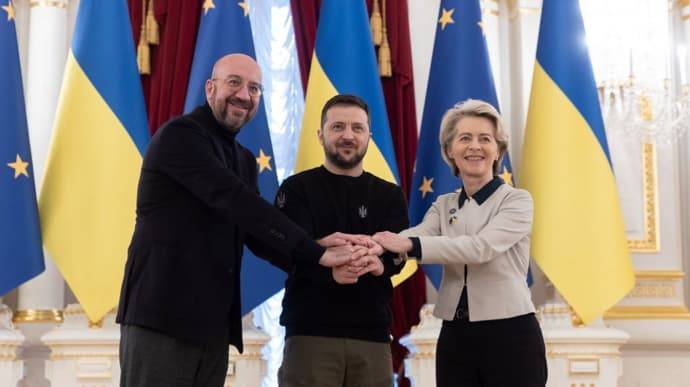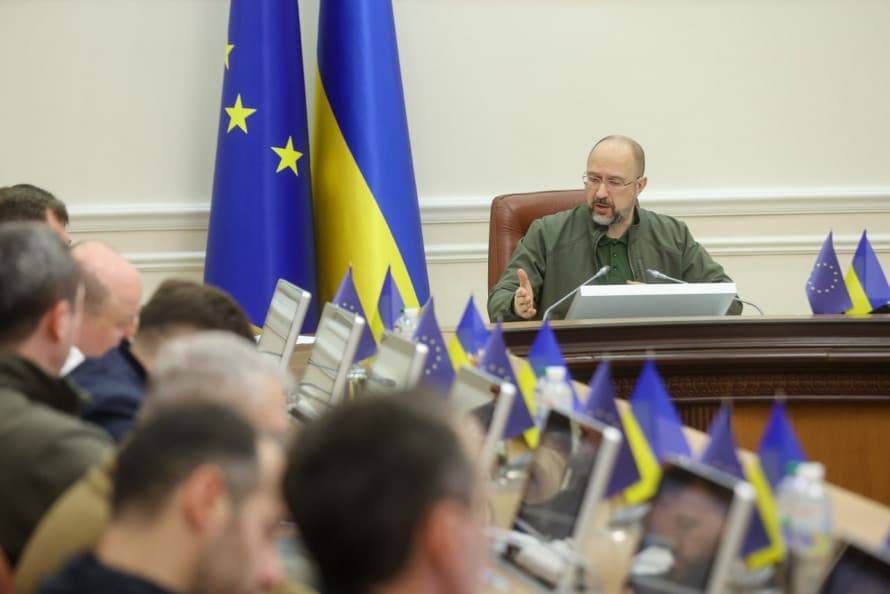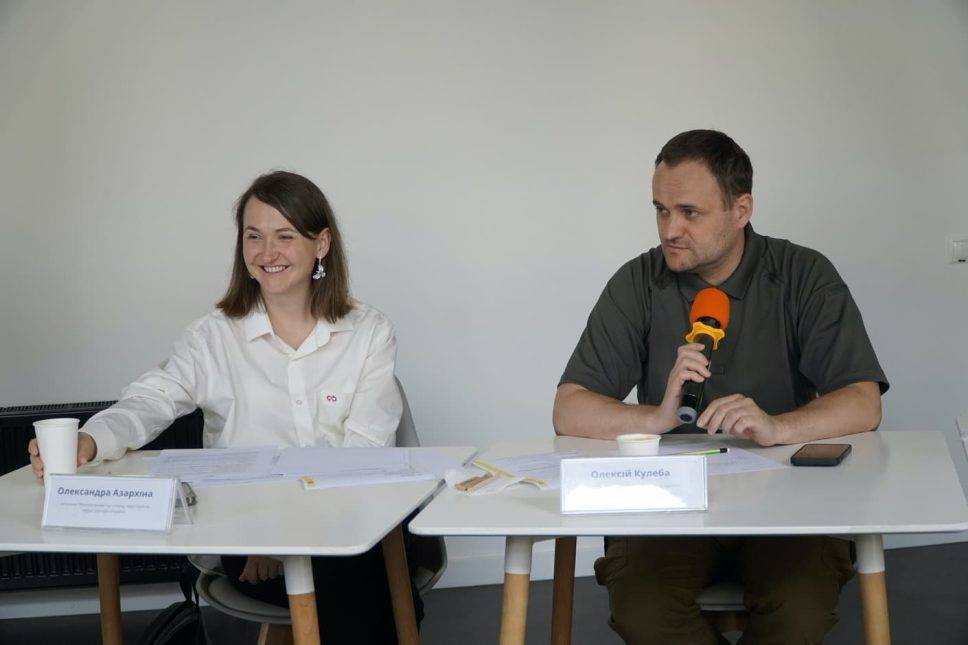
European integration of decentralisation: what Ukraine needs to fulfil for EU accession
On December 14, the leaders of the European Union approved a decision to open official accession negotiations with Ukraine. This is an important milestone in the European integration process of Ukraine. However, there is still a lot of work to be done, particularly in the areas of decentralisation and regional policy.
For negotiations to be successful, Ukraine needs to fulfil a long list of requirements and regulate state policy on local self-government. The European Commission will soon start preparing technical aspects of membership negotiations, the so-called negotiation framework, without which the start of the process is impossible. Most likely, the negotiation framework will be approved at the next EU summit in spring 2024.
“Victory of Ukraine. Victory of the entire Europe. Victory that motivates, inspires, and strengthens,” President Zelensky wrote immediately after the approval of the decision.
At the same time, Ukraine still needs to do a lot of work. In November, the European Commission published a report with an evaluation of Ukraine’s progress and steps to be taken for further European integration. Decentralisation in Ukraine was one of the issues discussed in the report.
Is Ukraine ready to discuss the issue of decentralisation with the EU? What challenges do local self-government bodies, government, and the parliament face? Let’s try to gain a better understanding.
Progress and criticism: in what areas we’ve seen progress and what needs to be considered
The decentralisation reforms are generally considered to be one of the most successful in the history of independent Ukraine. This is confirmed by the efficiency of municipalities in the context of the war, which for the most part have become a support for the state in difficult times, as stressed by the European Commission.
At first glance, it may seem that everything is fine in terms of the European integration of local self-government in Ukraine. According to the European Commission, Ukraine has made significant progress in this area. This applies in particular to the completion of the territorial part of decentralisation, according to which the number of counties in Ukraine was reduced from 490 to 136 through consolidation, and 1,469 territorial communities were formed, 144 of which are currently under occupation.
Separately, according to the European Commission, the law on service in local self-government bodies, which was adopted in May and signed by the president in July 2023, deserves attention. The new law introduced a clear procedure for competitive selection, transparent career growth, and work based on KPIs, as well as protection of employees and a guaranteed minimum wage.

In addition, the European Commission also highlighted the following positive factors in its report:
- Limited progress has been achieved in demarcating the levels of local administration: oblast, county, and municipal, as well as in dividing the powers of local self-government and the central government.
- Appropriate internal structures have been introduced for municipal administrations.
- Fiscal decentralisation was maintained, with 64% of personal income tax (PIT) and PIT from the military staff allocated to municipalities in 2023.
- Amendments to the Law of Ukraine “On the Fundamentals of State Regional Policy” were approved. They establish the basis for the rebuilding of war-affected regions of Ukraine, including a three-level system of strategic planning (national, regional, and local development strategies).
However, behind the facade of approval, there is also a lot of criticism and comments that lawmakers need to take into account in the near future. In particular, the biggest issue is the question of military administrations and the division of powers between the central and local authorities. Due to the martial law in Ukraine, 184 military administrations (MAs) have been established at the local level. While this is a logical step to take in frontline cities, it looks quite controversial in communities located very far from the combat zone.
The lack of clarity in the criteria for creating MAs is a separate issue. The European Commission pays particular attention to this, and not without reason. According to the Law of Ukraine “On the Legal Regime of Martial Law”, the head of the regional military administration can propose to the president to create military administrations in settlements in the event of violations of the Constitution or laws. In other words, instead of having clear criteria in place, such a decision is placed at the discretion of the Bankova, which creates great risks for the reduction of the powers of self-government and excessively centralizes power.
The EU also separately demands significantly greater involvement of local governments in the formation of state policies in the field of decentralisation and general coordination, since the current communication of communities with the government in general and the relevant ministry specifically leaves much to be desired. The report emphasized that the Congress of Local and Regional Governments cannot compensate for this problem, as it is an advisory body to the president.
The European Commission also highlights the following problems:
- The actual capacity of the government in terms of evidence-based policy- making remains insufficient. The explanatory notes that accompany legislative proposals do not often meet required standards.
- Budget transparency and openness in budgeting are limited in Ukraine, as reported by the Open Budget Index, and worsened under martial law.
- The introduction of basic mechanisms of managerial accountability of central government bodies in practice remains limited.
- There is no clear differentiation between economic and non-economic activities, and no clear de minimis rule.
- The system of vocational education in the regions needs modernisation, and it is necessary to merge vocational and higher education into a single system.
The system of vocational education in the regions needs modernisation, and it is necessary to merge vocational and higher education into a single system.
“Ukraine should refrain from enacting the law on urban planning in its current form as it creates integrity risks resulting from delegating excessive control powers in urban planning control from public to private entities, and leads to the disempowerment of local authorities in this sphere,” the report of the European Commission states.
On December 12, it became known about an attempt to push through a draft resolution of 232 pages at a government session, which is an exact copy of the controversial draft law No. 5655. It is a proposal by Oleksandr Kubrakov, Minister for Community Development, Territories and Infrastructure. Such actions could lead not only to further conflicts between the government, civil society, and local self-government but also jeopardize Ukraine’s European integration.

The problems of interactions between central and local governments
The situation surrounding draft law No. 5655 is a chronic problem that creates confusion and deepens the already great misunderstanding between communities and the Ministry for Community Development, Territories and Infrastructure.
Even before the controversial law was adopted in the second reading, the Ministry for Community Development was merged with the Ministry of Infrastructure. However, it was rather a de facto “absorption”, aggravated by a serious loss of personnel. This led to the loss of the ministry’s leadership positions in decentralisation (and it is the ministry that should be, according to the logic of governance, the main policymaker) and disagreements with local self-government.
The Ukrainian Municipal Forum on December 4-5, which brought together over 400 representatives of communities from all over Ukraine was a striking example of the situation that developed. It was the largest event with the participation of local self-government since the start of the full-scale war. In particular, the attendees discussed the report of the European Commission. Surprisingly, neither Deputy Prime Minister for Restoration of Ukraine Oleksandr Kubrakov nor Deputy Minister for Community Development, Territories and Infrastructure Oleksandra Azarkhina, attended the event, which was attended by the Chair of the G7 Ambassadors Group Kuninori Matsuda, EU Ambassador to Ukraine Katarina Mathernova, Head of the Council of Europe Office in Ukraine Maciej Janczak, as well as Members of the European Parliament.
Also, Deputy Head of the Office of the President in charge of regional policy issues Oleksiy Kuleba did not attend the forum. According to rumours, he refused to participate after an interview by Kyiv Mayor Vitaliy Klitschko with the German publication Spiegel, where he said: “Ukraine is on the path to authoritarianism.”
Klitschko’s tone at the forum was somewhat milder, but his general position remained the same: “I have already said this and I want to emphasize again – local self-government in all democratic countries is built from the bottom up, not the other way around. In its report, the European Commission identified the achievements, problems, and challenges of Ukraine’s path to the EU, including with regard to the development of local self-government. For this, local communities must have sufficient resources and powers to ensure the security of their territories and residents.”

The absence of key stakeholders from the Office of the President and the Ministry of Recovery at such an event is evidence of a breakdown in communication between the government and local self-government. Communities are discussing post-war recovery and development with representatives of the EU without the participation of the central government in terms of decentralisation and European integration.
There are two reasons for this breakdown, in addition to the already mentioned draft law No. 5655. The first is the situation with the transfer of military personal income tax (PIT) to the state budget, as a result of which the state budget received an additional UAH 214.7 billion. The second reason is the military administrations in settlements, which are already a point of contention between local self-government bodies and the Bankova.
At first glance, the situation with PIT may seem successful for the authorities, as it has brought additional funds for the army, but also put local budgets at risk, as for the most part, they were already allocating assistance to the Armed Forces of Ukraine. In fact, communities were helping the military even before the adoption of draft laws No. 9559D and No. 9560, which provide for the powers of local governments to support military units.
The issue of PIT requires a more thoughtful decision from the parliament and the government, as requiring proceeds from PIT to be transferred to the state budget contradicts the principle of integrity of the budget and tax systems, an issue Ukraine needs to resolve, according to the report of the European Commission. In addition, the burden on local budgets is increasing due to internally displaced persons (IDPs).
The situation with military administrations is a bit more complicated, especially those created in large cities for reasons unrelated to the war: Chernihiv and Sumy. Kyiv, which has long been in the deep rear, can also be included in this category.
Military administrations can be an effective tool, but in the absence of clear rules in the legislation, they also pose a serious threat to the powers of local self-government, blurring the line between local and central government. That is why the Verkhovna Rada is expected to adopt a new law on the criteria for the creation and liquidation of military administrations, which should be balanced and meet EU requirements.
The number of military administrations could increase significantly, as now, 254 communities in Ukraine do not have mayors, according to the Association of Ukrainian Cities. At the same time, about 7% of local deputies, mostly women, have resigned due to the ban on travel abroad for them. This ban creates another problem – the reduction of humanitarian aid from abroad. The Cabinet of Ministers banned travel back in May, and this created a rather dangerous precedent on the part of the executive branch. As noted by the executive director of the Association of Cities, Oleksandr Slobozhan, due to the lack of direct contact with the local self-government of Europe, the amount of assistance has decreased significantly.
“After the adoption of the Resolution No. 69 by the Cabinet of Ministers banning travel abroad for deputies of local councils, the amount of humanitarian aid has been constantly decreasing. It is impossible to create partnerships without personal contact, it cannot be done via Zoom or by phone. This requires live communication. They will not be able to come here, and we cannot force them to risk their lives,” says Slobozhan.
It is clear that the “artificial” restriction of contacts with Europe also gives rise to the “need for the Association of Ukrainian Cities to organize discussions on the European integration future together with international partners.”
Homework for Ukraine
Despite the positive decision of the EU to open negotiations on Ukraine’s accession, the government and parliament still have a lot of work to do to organise local government in accordance with EU standards. Ukraine must also prepare for the restoration of local self-government in occupied and frontline areas, where different approaches will often have to be applied depending on regional specifics.
The EU also expects the government to update the State Regional Development Strategy (2021-2027) given the challenges of the war and to modernize the State Regional Development Fund to align them with the recovery and reconstruction process, as well as multilevel governance. The draft of the Strategy that was presented has serious problems that will certainly be described by experts. In this context, it is also necessary to finally admit the failure of the “urban planning reform” No. 5655 and to stop lobbying it in the form of a draft law or government resolution. Another issue that will need to be resolved is granting legal entity status to municipalities, which has been quite controversial for a long time, but is included in the requirements of the European Commission.
It is clear that all tasks can be accomplished only in cooperation between the state government and municipalities with active participation of representatives of local self-government, as repeatedly emphasized in the report.
Media, Publications
-
Deputy Ambassador of the EU on enlargement, reforms and €190 billion in support
-
EU membership in 2030? Deputy Ambassador of the EU answers students’ questions
-
How does the EU take decisions on Ukraine? Subsidiarity, unanimity and consensus among 27 countries
-
What reforms does Ukraine still need to join the EU? Deputy Ambassador of the EU answers
-
How can Ukrainian students become more involved in EU programmes and projects? Deputy Head of the EU Delegation answers
-
Are there alternatives to European integration if the road to the EU is long? Deputy Ambassador of the EU answers